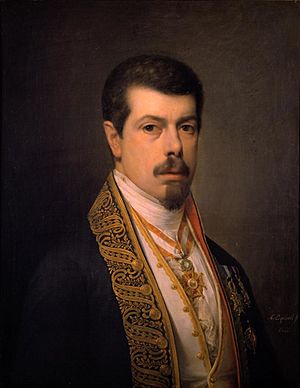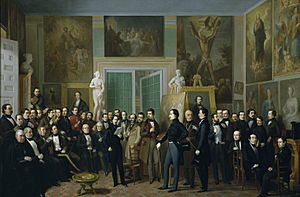Antonio María Esquivel facts for kids
Antonio María Esquivel y Suárez de Urbina (born March 8, 1806 – died April 9, 1857) was a Spanish painter. He was known for his beautiful portraits and painted in the Romantic style. He lived during the 1800s and became a very important artist in Spain.
Contents
Life of a Spanish Painter
Antonio María Esquivel was born in a city called Seville, Spain. His father was a soldier who rode horses (a cavalry officer). Sadly, his father died in a battle in 1808 when Antonio was very young.
Antonio started learning art at a special school in Seville, the Real Academia de Bellas Artes de Santa Isabel de Hungría. There, he learned painting techniques from famous artists like Murillo.
Moving to Madrid
In 1831, Antonio was married and needed work. So, he moved to Madrid and joined another art school, the Real Academia de Bellas Artes de San Fernando. He was a very good student and earned a scholarship.
Antonio also became involved in the artistic and intellectual life of Madrid. In 1837, he helped start a group called the "Artistic and Literary Lyceum." Here, he taught classes about human anatomy, which is important for drawing people correctly. He later taught this subject at the San Fernando Academy as well.
Facing Challenges
In 1839, Antonio returned to Seville. He became very ill and almost lost his eyesight. His friends and colleagues from the Lyceum helped him. They collected money so he could see a famous eye doctor in France. Thanks to their support, he got his vision back by the end of 1840.
Later Life and Achievements
Antonio received many official honors for his art. He was given the "Commander's Cross" of the Order of Isabella the Catholic. In 1843, he was named a Court painter, which meant he painted for the royal family. In 1847, he became a Professor at the San Fernando Academy.
He also helped create the "Society for the Protection of the Fine Arts." Antonio wrote a book about art theory called Tratado de Anatomía Pictórica. He passed away in Madrid at the age of 51.
Antonio's sons, Carlos and Vicente, also became painters, following in their father's footsteps.
See also
 In Spanish: Antonio María Esquivel para niños
In Spanish: Antonio María Esquivel para niños
 | Stephanie Wilson |
 | Charles Bolden |
 | Ronald McNair |
 | Frederick D. Gregory |



